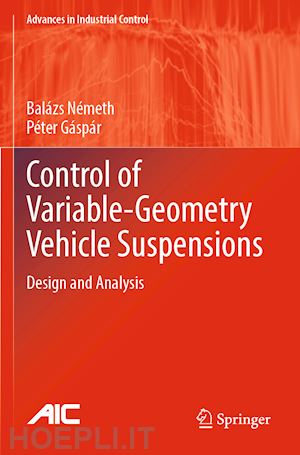
Questo prodotto usufruisce delle SPEDIZIONI GRATIS
selezionando l'opzione Corriere Veloce in fase di ordine.
Pagabile anche con Carta della cultura giovani e del merito, 18App Bonus Cultura e Carta del Docente
This book provides a thorough and fresh treatment of the control of innovative variable-geometry vehicle suspension systems. A deep survey on the topic, which covers the varying types of existing variable-geometry suspension solutions, introduces the study. The book discusses three important aspects of the subject:
• robust control design;
• nonlinear system analysis; and
• integration of learning and control methods.
The importance of variable-geometry suspensions and the effectiveness of design methods implemented in the autonomous functionalities of electric vehicles—functionalities like independent steering and torque vectoring—are illustrated. The authors detail the theoretical background of modeling, control design, and analysis for each functionality. The theoretical results achieved through simulation examples and hardware-in-the-loop scenarios are confirmed. The book highlights emerging ideas of applying machine-learning-based methods in the control system with guarantees on safety performance. The authors propose novel control methods, based on the theory of robust linear parameter-varying systems, with examples for various suspension systems.
Academic researchers interested in automotive systems and their counterparts involved in industrial research and development will find much to interest them in the eleven chapters of Control of Variable-Geometry Vehicle Suspensions.
Balázs Németh has been a senior research fellow of the Systems and Control Laboratory (SCL) in the Institute for Computer Science and Control (SZTAKI) since 2007. He received his Ph.D. degree in Transportation Sciences from Budapest University of Technology and Economics (BME) in 2013. He is an honorary associate professor of BME, and he lectures in B.Sc., M.Sc., and Ph.D. courses on control system theory and vehicle control. He has published 102 journal papers, 4 books, and 107 papers in conference proceedings. His main research areas are analysis and synthesis of autonomous vehicle control systems, energy-optimal control of road vehicles, integration of learning and control methods, and ethics of autonomous vehicle systems.
Péter Gáspár received both M.Sc. and Ph.D. degrees from the Faculty of Transportation Engineering and Vehicle Engineering, Budapest University of Technology and Economics (BME) in 1985 and 1997, respectively, and his D.Sc. degree in Control from the Hungarian Academy of Sciences (MTA) in 2007. Since 2022 he has been a full member of the MTA. He is head of the Systems and Control Laboratory (SCL) in the Institute for Computer Science and Control (SZTAKI) and is also a full professor at the Department of Control for Transportation and Vehicle Systems, BME. He is a member of IFAC Technical Committees on both Automotive Control and Transportation Systems. He is a co-author of 4 monographs on systems and control theory and vehicle control and the co-author of 7 university textbooks. He has published 226 journal papers, 5 book chapters, and 310 papers in conference proceedings with more than 2250 citations. His research interests include linear and nonlinear systems, robust control, system identification, and machine learning methods. His research and industrial works have involved mechanical systems, vehicle structures, and vehicle dynamics and control.











Il sito utilizza cookie ed altri strumenti di tracciamento che raccolgono informazioni dal dispositivo dell’utente. Oltre ai cookie tecnici ed analitici aggregati, strettamente necessari per il funzionamento di questo sito web, previo consenso dell’utente possono essere installati cookie di profilazione e marketing e cookie dei social media. Cliccando su “Accetto tutti i cookie” saranno attivate tutte le categorie di cookie. Per accettare solo deterninate categorie di cookie, cliccare invece su “Impostazioni cookie”. Chiudendo il banner o continuando a navigare saranno installati solo cookie tecnici. Per maggiori dettagli, consultare la Cookie Policy.